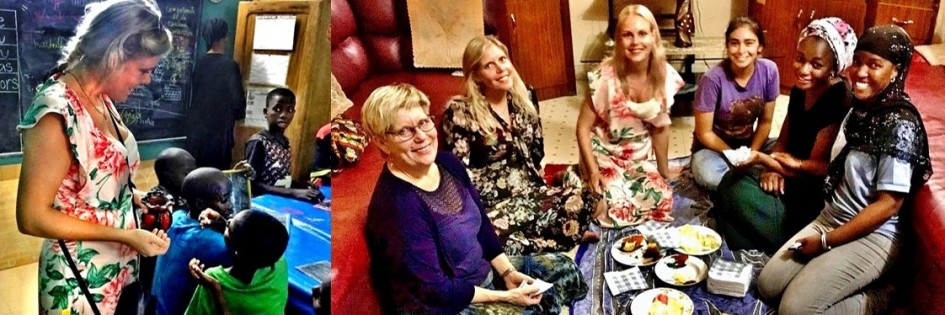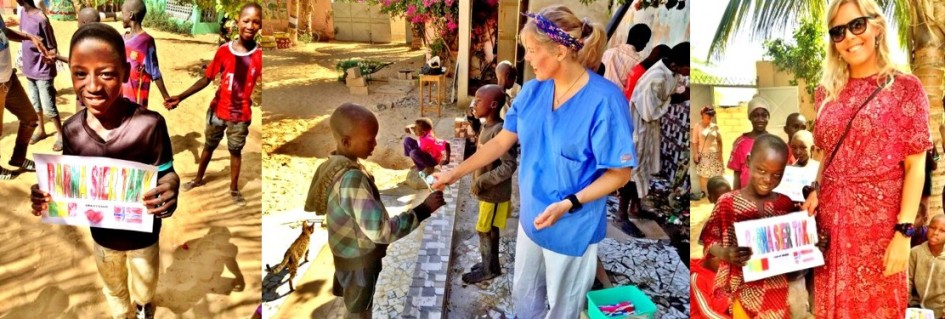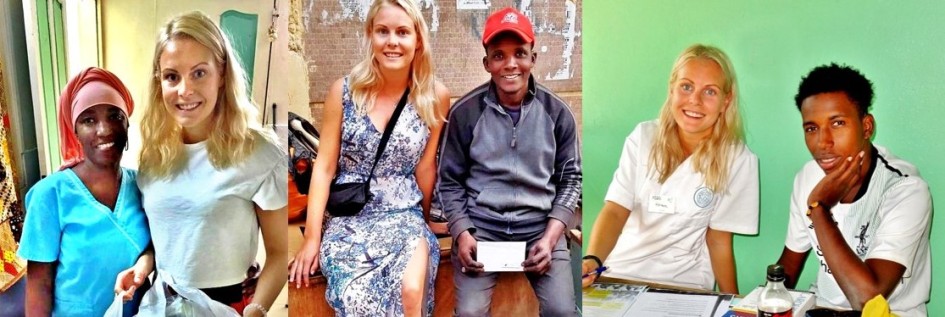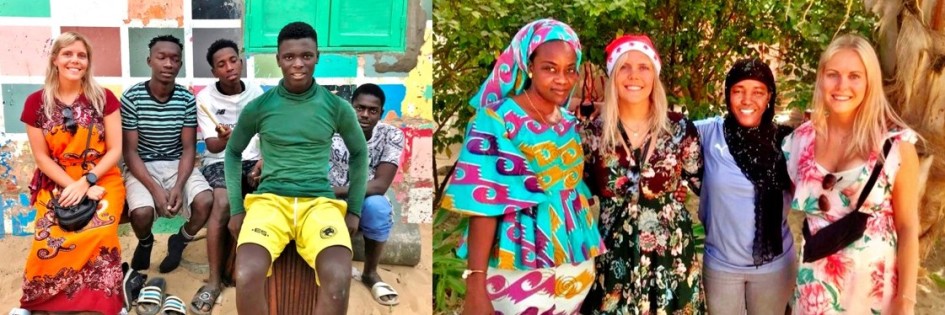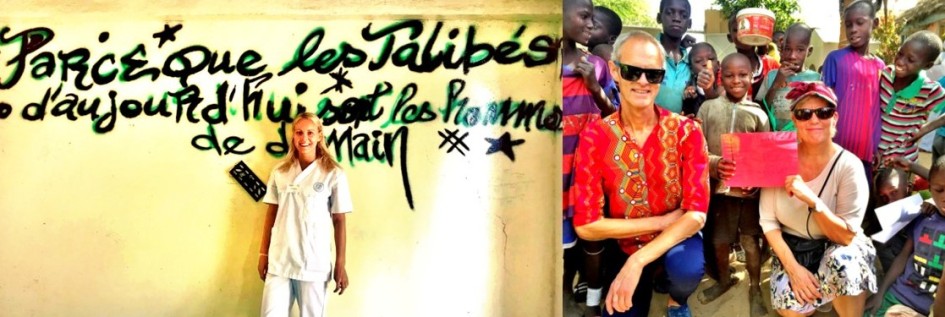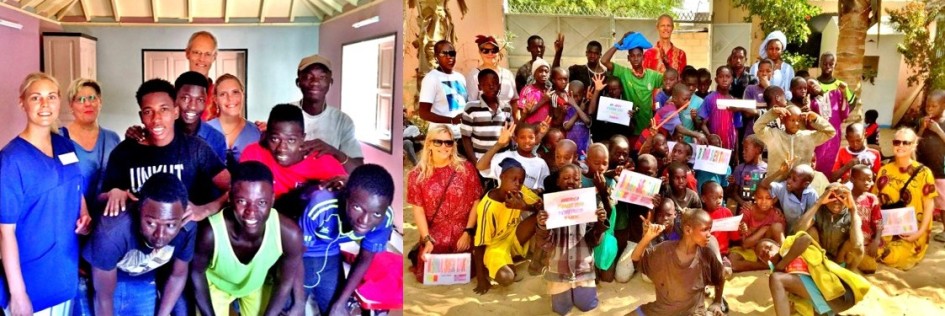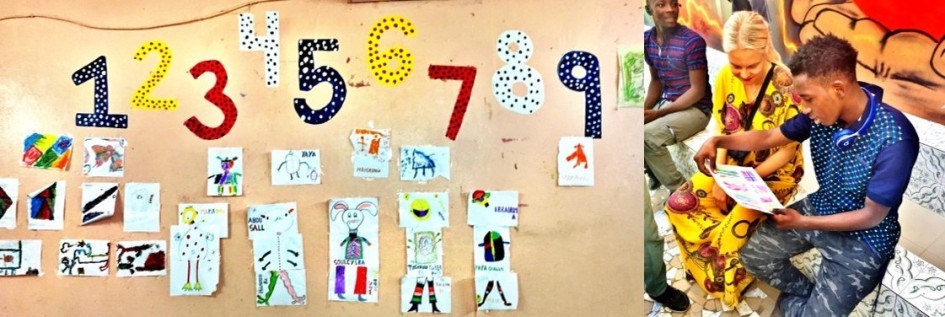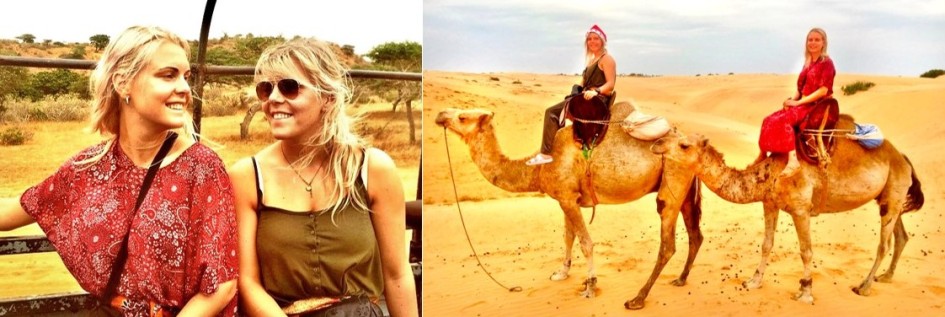News from Maison de la Gare
Christmas in Saint Louis
Tweeter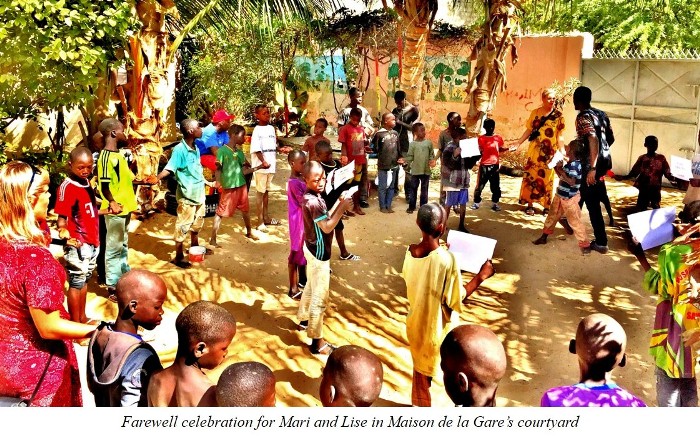
Stories from a Norwegian family, volunteers and visitors at Maison de la Gare
Mari and Lisa Øyen were valued volunteers with Maison de la Gare in
the final months of 2018, living with a Senegalese host family and
spending their days working with the talibé children. Their parents
Eva Steinkjer and Øyvind Øyen joined them in Saint Louis for the Christmas
and New Year’s holiday. This is their story.
From Eva, the mother
We stayed at the hotel La Maison Rose in Saint Louis, in a quiet and
welcoming atmosphere. Every morning at breakfast we were surrounded
by walls decorated with artwork showing different
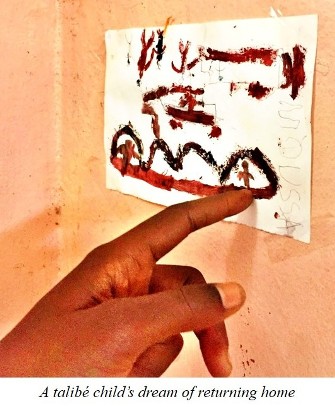 scenes of colored
people serving a white person. Senegal’s colonial period, that ended
in 1960, was still alive in this room.
scenes of colored
people serving a white person. Senegal’s colonial period, that ended
in 1960, was still alive in this room.
We were told that the marabouts (Muslim religious leaders and teachers)
played important roles in the liberation of Senegal. We learned that
their followers are called talibés, and that they need donations to eat
and to meet their basic needs. In Norway, we know nothing about these
boys having to beg in the streets. The talibé boys can be as young as
4 years old, and many have been sent from poor homes in the countryside.
“I have a dream” - I am standing in the classroom where
tables are crowded with boys making “thank you” drawings for Mari
and Lise.
Other drawings are displayed on the walls. When I stop and look
interested, Abdou stands beside me and tells me the story of a drawing
in brown paint. He recalls the boy who painted it, who told him that
it was the famous Faidherbe bridge (which I recognize as the bridge
that connects the island of Saint Louis with the mainland). The boy
himself is depicted on the bridge, and he has painted
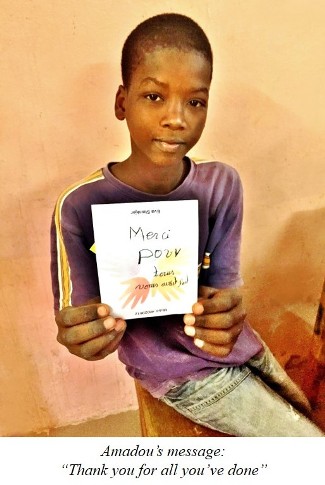 a car in the
middle of the bridge. At the top of the white sheet of paper he has
drawn some people: a sister, a brother and the rest of his family.
Abdou tells me that the boy wanted the car to come and take him back
to his family. Perhaps an impossible dream, but still a dream. As
an art therapist, I know that the ability to dream creates hope and
contact with inner life. This drawing may be difficult for us to
look at as witnesses who know about the reality of these boys’ lives, but
it can provide strong support for their emotional health.
a car in the
middle of the bridge. At the top of the white sheet of paper he has
drawn some people: a sister, a brother and the rest of his family.
Abdou tells me that the boy wanted the car to come and take him back
to his family. Perhaps an impossible dream, but still a dream. As
an art therapist, I know that the ability to dream creates hope and
contact with inner life. This drawing may be difficult for us to
look at as witnesses who know about the reality of these boys’ lives, but
it can provide strong support for their emotional health.
“Merci pour tous vous avait fait” (Thank you for all you’ve done) -
I am not sure what I expect from my visit to this room with the boys’
drawings. I have brought some small sheets of paper, scissors, some colored
pencils, stickers, glue and markers with me from Norway. The papers are
embossed with my logo, name and phone number. I am sitting beside a boy
who spontaneously says to me: “C’est ton nom?” (Is that your name?)
I look at him and say “Oui. Comment tu t’appelles ?” (Yes. What’s
your name?) He says his name: Amadou. We are connecting. I watch
how the boy draws. I
have seen this situation many times as a teacher in Norway. The children
want to make straight lines, and use the eraser generously. Amadou draws a
house with an open door. I ask him who lives in this house. He answers:
“moi”. Then he draws himself in the doorway and writes his name
underneath it. 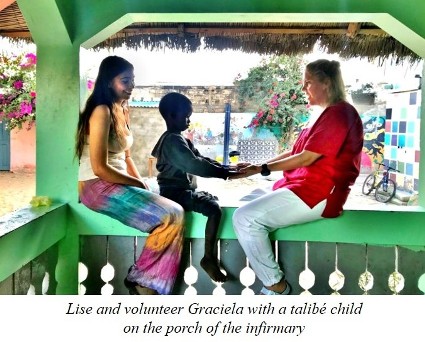 Another boy who is older than Amadou is sitting on the
opposite side of the table. He can’t write his name and asks Amadou to write it for him.
Amadou continues to write, and after a while he shows me what he has
written: Merci pour tous vous avait fait.”
Another boy who is older than Amadou is sitting on the
opposite side of the table. He can’t write his name and asks Amadou to write it for him.
Amadou continues to write, and after a while he shows me what he has
written: Merci pour tous vous avait fait.”
Reflecting on this experience, I see how the boys’ artwork is a way of
communicating, both their reality and their dreams. I would be happy to
support more of this work, although I’m not sure how to do this. Still,
I’m thankful for this visit to Maison de la Gare and will work to find
ways to support their work.
From Lise, volunteer
“Sometimes it feels like there is so little I can do. But at least
I can stop when I meet the boys in the street. I do not give them money,
but I ask them their names. They all have a name - they exist!”
I decided to work as a volunteer during my three week Christmas holiday.
The thing I was most nervous about was celebrating Christmas in a Muslim
country like Senegal. I have spent every single Christmas of my life at
home in Norway, doing the same things every year. And, no matter where
I am or what I’m 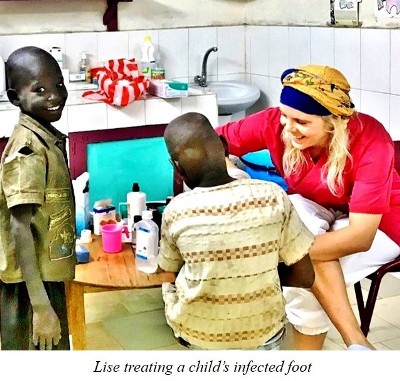 doing, going home for Christmas was always what I
pictured. Despite this, Mari managed to convince the whole family that
celebrating Christmas in Senegal would be a good idea.
doing, going home for Christmas was always what I
pictured. Despite this, Mari managed to convince the whole family that
celebrating Christmas in Senegal would be a good idea.
My Christmas traditions are still important to me, and celebrating next
Christmas in Norway might be even better than usual because of what we
experienced in Saint-Louis. Volunteering for Maison de la Gare may be
the single most important thing I’ve done in my entire life. And, in
some ways, I think it was important for me that I did it during Christmas.
Kindness, helping each other and taking extra care of each other are some
of the things I like about Christmas. Helping the talibé children and
experiencing their gratitude when receiving their Christmas presents was
perhaps the best Christmas present I could ever get.
The cultural gap between Norway and Senegal is enormous. Seeing begging
children all the time on the streets, knowing that they are going to be
beaten if they don’t earn enough money that day. That was maybe the most
challenging thing being a volunteer. Every day it was a constant struggle
not to take the talibé children home with me, thinking I could be a mother
to them.
Working in the infirmary, we saw and treated many wounds and skin diseases.
We met many talibé boys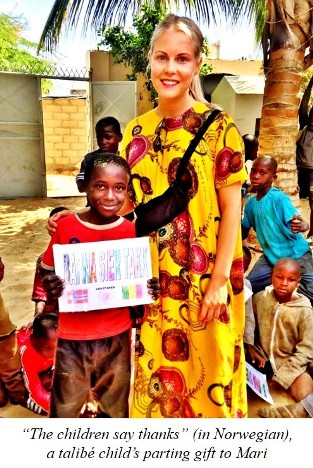 we’ll never forget, and I will tell you about two
of them. One day an older talibé (perhaps 13 years old) came with a
younger one. He was not more then 5, and had an old piece of a wooden
toothbrush in his ear. How it ended up in his ear, we will never know.
The little kid was suffering a lot of pain. So Mari and I went to the
hospital with him with one of Maison de la Gare’s staff members. The
boy was so scared, and we tried to calm him down with body language. At
the hospital, the doctors got the piece of wood out of his ear. Without
help, he would likely have gotten an infection and lost his hearing. He
got help because of Maison de la Gare and the donations that make their
work possible.
we’ll never forget, and I will tell you about two
of them. One day an older talibé (perhaps 13 years old) came with a
younger one. He was not more then 5, and had an old piece of a wooden
toothbrush in his ear. How it ended up in his ear, we will never know.
The little kid was suffering a lot of pain. So Mari and I went to the
hospital with him with one of Maison de la Gare’s staff members. The
boy was so scared, and we tried to calm him down with body language. At
the hospital, the doctors got the piece of wood out of his ear. Without
help, he would likely have gotten an infection and lost his hearing. He
got help because of Maison de la Gare and the donations that make their
work possible.
The next talibé boy I will tell you about, Babacar, was a common case.
He came in with severe scabies. Scabies is a serious skin disease that
results in extreme itching and rashes. It’s caused by a parasite that
digs tunnels under the skin. To get rid of this disease you have to
wash all your clothes and bed sheets at 60 degrees (about 140 F), wash
yourself and your family and get scabies treatment. However, the talibé
boys live together with around 50 other boys, so it’s impossible to treat
everyone. At Maison de la Gare, we often gave the boys new clothes since
they only wash their clothes in cold water. The first time I met Babacar
I gave him new clothes, but the next day he wasn’t wearing them. I asked
why, and he answered that the marabout had taken the clothes. In spite
of this, Babacar seemed to do well with our treatments. We met him many
times on the streets during our visit. He always smiled and came over
to shake hands. One time one of his friends also came over and called
me Santa.
From Mari, volunteer
I have experienced and learned so much in my two months as a nvolunteer nurse
for Maison de la Gare. Above all, I will always remember the beautiful
boys and the staff members
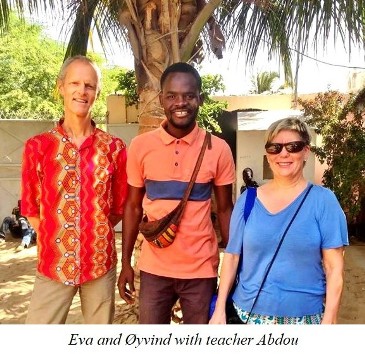 that I met at the center.
that I met at the center.
My sister has described some of the challenges you face as a Norwegian
girl in Saint Louis. The last two months have not been easy, but I’ve
learned more than I could have expected. I am truly proud of being a part
of the Maison de la Gare team, and I will continue to support their vision.
The Senegalese people have taught me how to share, to make the most out
of what you have, and to take care of the people you love and give each
other time. I will never lose this. I am returning to Norway with a
new view of my life and of my background. I am grateful for having being
born in one of the most developed countries in the world, where women and
men have the same jobs. We must support the developing parts of the
world. The talibé boys deserve and have the right to a better future.
Thank you Maison de la Gare, for helping us help these talibé children.
We will never stop doing that.

